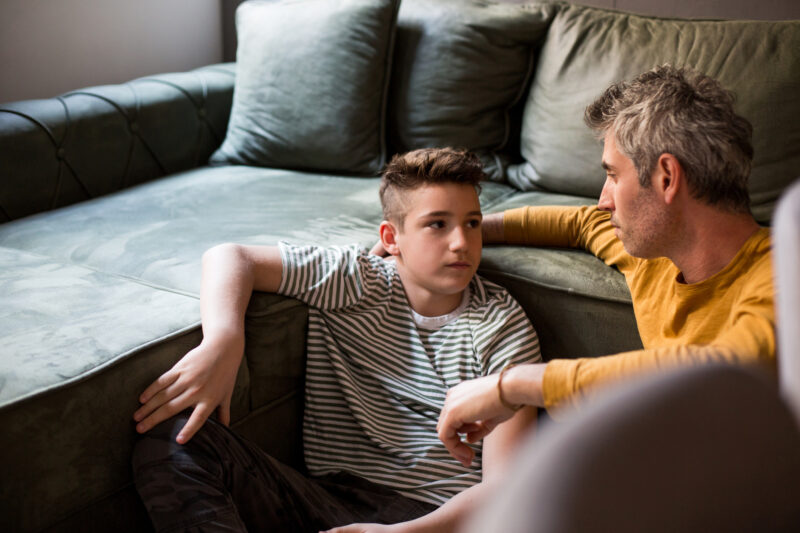
Table of Contents
How to Tell Kids About Divorce, According to Therapists

Written By: Sarah Fielding

Clinically Reviewed By: Cecilia Masikini
September 8, 2025
5 min.
Expert-approved tips about how to tell you kids you’re getting a divorce.
Learn more about our Clinical Review Process
Table of Contents
Parenting is challenging, especially in moments of turmoil. Getting divorced can be an incredibly difficult topic to navigate. There are so many factors from when to tell them to supporting them while coping yourself. We spoke with experts to give you insight into how to tell kids about divorce and help them cope in the aftermath. Here’s what you need to know.

Divorce can take a toll on your family’s well-being, but support is available
Charlie Health offers virtual treatment for parents and kids to navigate this transition together.
How to tell kids about divorce
Divorce can be confusing and upsetting for children, but how you share the news can make a big difference. These tips from Charlie Health experts can help you approach the conversation with care, clarity, and compassion.
1. Use age-appropriate language
Now is not the time to use legal jargon or give adult details about the impending divorce, says Charlie Health Group Facilitator Bree Williams, LPCA. Do your best to use age-appropriate language that is direct and simple. What you say to an older child about the separation might be different than what you tell young children. This conversation will change even more so if you have an adult child.
2. Choose the right time
Charlie Health Contemplative Practitioner Tairesha “Sunflower” Flemister, LMSW, stresses the importance of choosing a calm, private moment to tell your kids about the divorce. They need an opportunity to process the change in their family dynamic, so avoid sharing the news before bed, school, or any event that requires their attention.
3. Remind them it’s not their fault
It’s far too easy for a child to have negative feelings and blame themselves for their parents’ divorce. Reassure them that this is an adult decision that has no reflection on them.
4. Present a united front
No, it’s not always possible to stand united with the person you’re divorcing. But, if there’s any opportunity to do so, it can help to show a united front when talking to your kids, says Charlie Health Licensed Creative Arts Therapist Courtney Way, MA, LCAT. This positioning in a divorce conversation can help them feel greater stability.
5. Don’t blame the other parent
On a similar note, your child is not the person to share how you really feel about the person you’re divorcing. “Negative talk can create confusion, guilt, and loyalty conflicts for children,” says Williams.
How to be receptive to your kids’ feelings
Being there for your children can make a world of difference in their well-being. “Divorce can feel like a loss for children, but it doesn’t have to define their sense of security,” says Flemister. “When parents show unity, respect, and patience, children learn that even big changes can be managed with love and support.”
1. Practice active listening
The experts each stress the importance of hearing what your child has to say. Encourage them to ask you questions or voice what they’re thinking. You might not have solutions, but you can listen and give them space for their feelings.
2. Validate, don’t judge
There is no one “right” way your kids will react. Be there for them whether they cry, stay quiet, or even act relieved, says Flemister. Again, you might not be able to fix anything for them, but your presence and understanding can provide tremendous emotional support, adds Williams.
3. Have regular check-ins
Children’s feelings can come in waves during the divorce process and long after. Check in with your kids regularly to see how they are, help them feel supported, and remind them that their voices matter.
Flemister adds that holidays and milestones can also resurface children’s feelings, so check-ins can be particularly helpful around these times.
How to help your kids cope with your divorce
Helping your children navigate a divorce takes intention and care. These strategies from Charlie Health experts can support your kids’ emotional well-being, build resilience, and create stability during this transition.
1. Maintain a routine
Williams and Flemister emphasize that a routine can provide children with a sense of safety and security during times of upheaval. Whether it’s maintaining a bedtime or certain activities, you can help them feel grounded by keeping a routine.
2. Communicate clearly about changes
Again, the more ways you can provide predictability for your children, the better. “Clear communication about upcoming changes — such as living arrangements or visitation schedules — reduces uncertainty and anxiety,” says Way.
In blog: https://www.charliehealth.com/post/how-family-therapy-can-help-your-teen
3. Encourage healthy forms of expression
Your child might benefit from having a healthy outlet. Do they like sports, art, journaling, or another creative outlet? Encourage them to pursue it in a way that feels therapeutic for them. Being active or creative can help them process their emotions in a beneficial way, says Williams.
4. Model healthy coping
You’re human and also just doing the best you can. But when you’re able to, try to model healthy coping mechanisms, like using calming strategies, says Flemister.
5. Lean on outside support
You are going through a divorce, and that is a lot to handle in and of itself. Let other people help you when it comes to your kid’s well-being. Outside support, like teachers and school counselors, can provide a valuable perspective on how your child is doing during the day, says Flemister.
Child and family therapy or a support group can also provide a safe space for them to share their feelings and engage in conversation with someone other than their divorced parents. A family therapist can also provide a space for you to have the hardest conversations with your kid and learn coping mechanisms together.

How Charlie Health can help
If you or a loved one is struggling during a divorce, Charlie Health is here to help. Charlie Health’s virtual Intensive Outpatient Program (IOP) provides more than once-weekly mental health treatment for dealing with serious mental health conditions. Our expert clinicians incorporate evidence-based therapies into individual counseling, family therapy, and group sessions. With treatment, managing your well-being during a divorce is possible. Fill out the form below or give us a call to start healing today.




